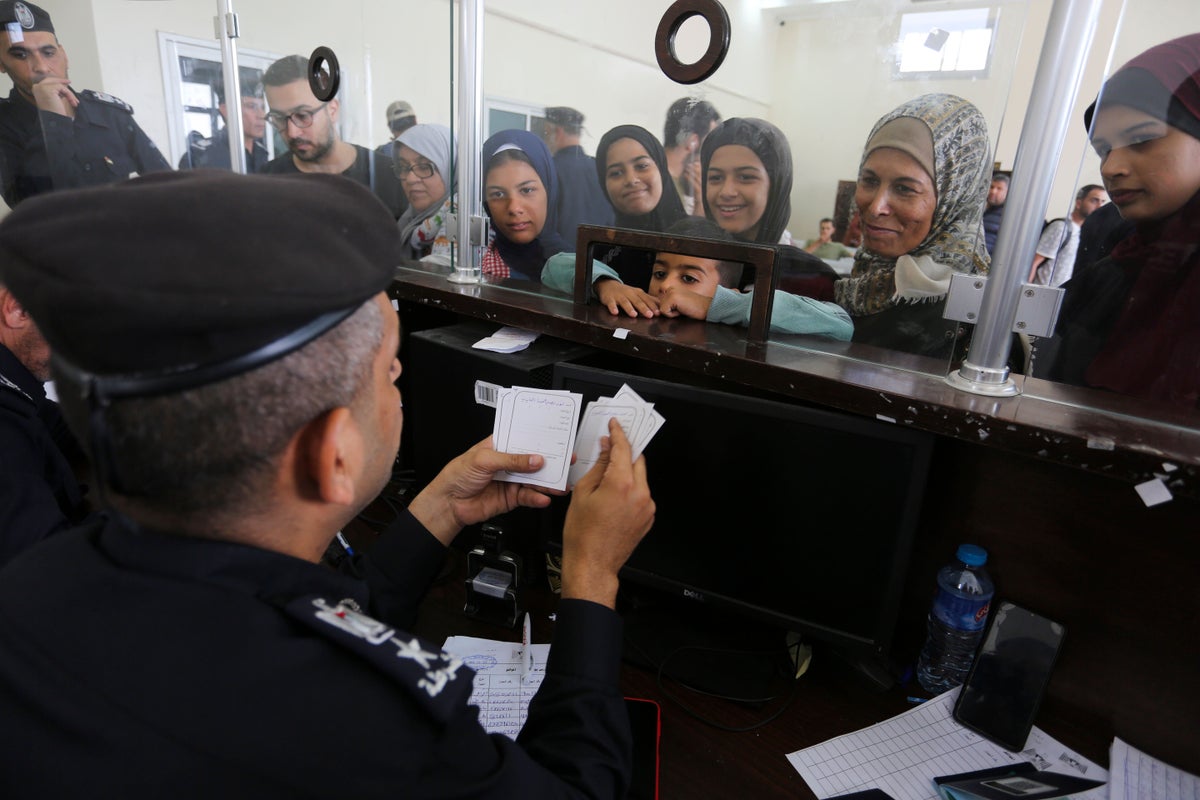
Intensive diplomatic efforts to allow Britons to flee Gaza are continuing as Israeli forces continue to advance through the territory.
Two UK aid workers managed to leave the Gaza Strip through the Rafah crossing into Egypt on Wednesday, but around 200 British nationals face an anxious wait for permission to make the journey to safety.
More foreign nationals made the journey on Thursday, with hopes that some Britons may be among those allowed to leave.
The Hamas-run health ministry said more than 9,000 people have been killed in the Gaza Strip since October 7 when Israel launched its military response to the atrocities committed by the group.
Aid agencies are battling a humanitarian crisis in the war-ravaged territory with limited resources.
Labour frontbencher Jess Phillips warned that Britons were not getting out quickly enough, arguing that the Government’s diplomatic efforts did not appear to be having “much sway”.
She also suggested that the Israeli military action against Hamas would only end in “death and destruction” as she called for “peaceful political solutions” to be negotiated.
The Foreign Office provided the Israeli and Egyptian authorities with a list of British nationals and their dependants, prioritising by medical vulnerability.
The total is thought to be in the low hundreds.
Border Force officials deployed in Egypt to help UK nationals have been bolstered by the arrival of a rapid deployment team from the Foreign Office and psychosocial support experts from the British Red Cross.
Downing Street confirmed that two UK aid workers were among those to make it through the Rafah crossing, which is the only gateway to Gaza not controlled by Israel.
Ms Phillips, MP for Birmingham Yardley, told BBC Radio 4’s World At One programme that there “doesn’t seem to be much movement in getting British people out of Gaza” as she took aim at Prime Minister Rishi Sunak’s diplomatic efforts.
“What worries me and what worries my constituent who is sat at home waiting for his 16 family members, one of whom is four months old, is that we’re not seeing any British names put on to the list of those who are crossing,” she said.
Ms Phillips noted that there were 400 names on the US list of those being told they could travel through the Rafah crossing on Thursday, while there were none explicitly listed as British.
There is a list of people that are British nationals - 200 I believe is the figure that I have - and our focus is on getting them out as quickly as we possibly can— Cabinet minister Michelle Donelan
It is possible however that UK nationals are listed as either dual or “international” under their citizenship.
Ms Phillips said that Mr Sunak’s social media pictures of diplomacy were “all very well and good for Twitter but it doesn’t seem that the British Government are having that much sway in getting their people out to Egypt”.
Cabinet minister Michelle Donelan said the Prime Minister and Foreign Secretary James Cleverly were continuing efforts to get more Britons out.
“The Foreign Office have said that some people have managed to get over that border and we are anticipating that there will be more coming,” the Science Secretary told GB News.
“There is a list of people that are British nationals – 200 I believe is the figure that I have – and our focus is on getting them out as quickly as we possibly can.”
But Ms Donelan also stressed the challenges.
“We’re not in full control of that border, as you know, so it is very difficult,” she told Sky News.
“But the Foreign Secretary and the Prime Minister have said multiple times it is our top priority to get those British nationals out as quickly as we possibly can.”
Mr Sunak discussed the crisis with UN secretary-general Antonio Guterres at the AI summit the Prime Minister is hosting at Bletchley Park.
“The leaders then discussed the worsening humanitarian situation in Gaza and agreed on the importance of urgently scaling up the delivery of life-saving humanitarian aid,” a Downing Street spokesman said.
“The Prime Minister set out the work the UK is doing to support, including doubling aid funding for the United Nations and others’ work in Gaza and pre-positioning emergency supplies and equipment in Egypt.
“The Prime Minister and the secretary-general agreed on the need to reinvigorate international efforts to reach a lasting resolution to the conflict and progress work towards a two-state solution.”
On Wednesday Mr Sunak used a call with Egypt’s president Abdel Fattah El-Sisi to thank him for his efforts to get the first British nationals to leave through the Rafah border.
The UK has a Border Force team in Cairo, with consular officials in Arish, near Rafah, to provide support for Britons who leave Gaza.
The RAF has flown further equipment to the region which could be used in the humanitarian relief effort, but aid agencies have complained that only limited amounts of life-saving food and medicine have been allowed into Gaza.







